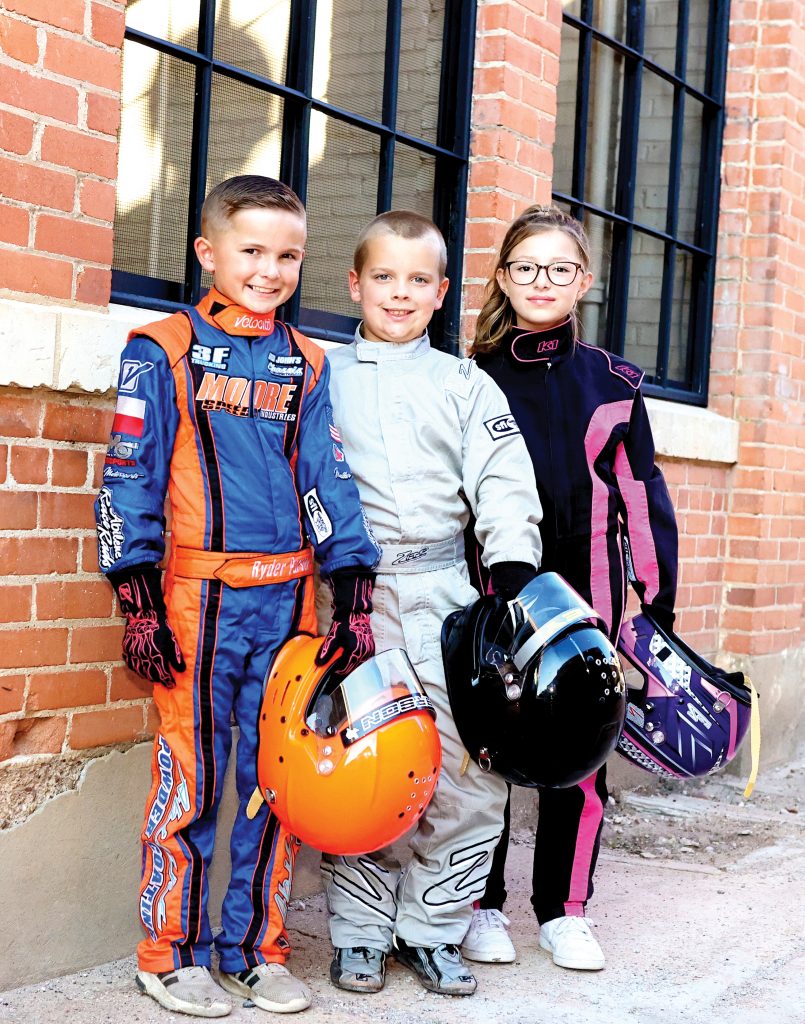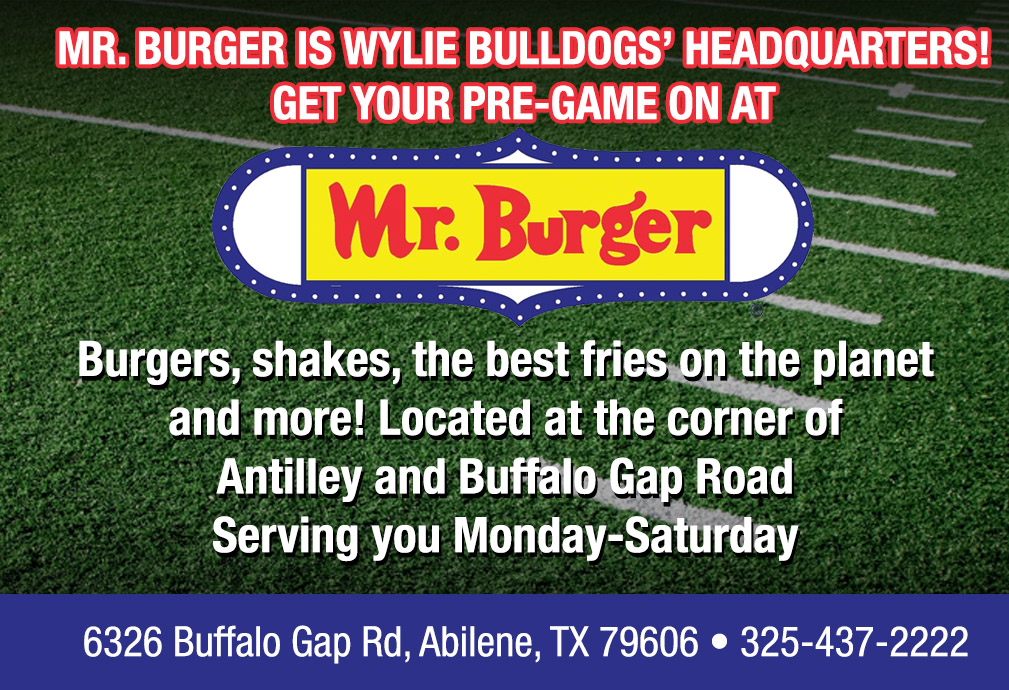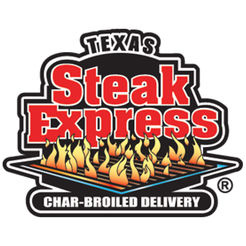A generational need for speed runs through these little racers from head to toe. Brynlee Underwood, Trey Giles, and Ryder Parson have a friendly competition on the track, but also treat each other like family off the track. With great support from their families, they have become quite the cart racers. Here is a glimpse into the world of our youngest Bulldogs who have gone wild.
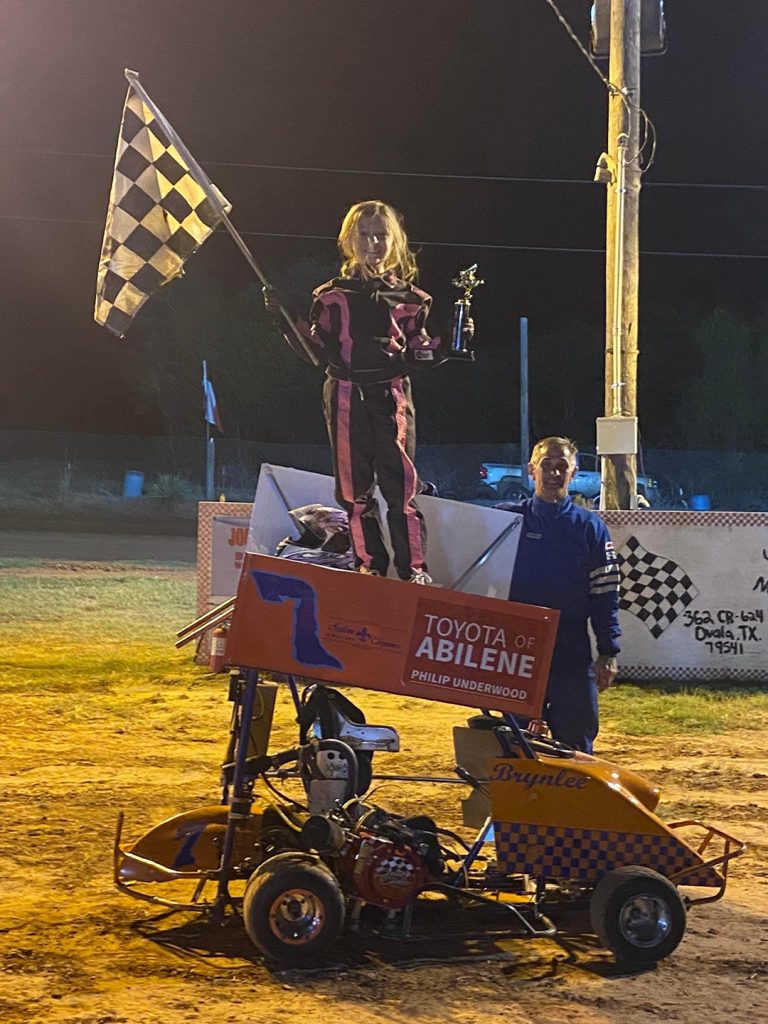 BRYNLEE UNDERWOOD
BRYNLEE UNDERWOOD
Brynlee is the youngest of her siblings and the quietest of the Bulldog racers, but don’t let that fool you. She is a fierce competitor.
“I love winning,” said Brynlee. “I also love drifting and spinning out.” However, Brylee said the hardest part of racing is controlling the cart. “You can stall-out, and then you have to wait for a person on a 4-wheeler to come pull you off the track.”
Brynlee started racing when she was five years old alongside her older siblings Cadence and Ryan. Now, six years later, Brynlee is the lone racer out of her siblings. In that time, Brynlee has raced in over twenty-six races and won six of those. Amber Underwood, Brynlee’s mom, said it would have been more, but it’s less due to the shutdowns during Covid.
Racing has been in Brynlee’s family for three generations thanks to her grandfather Charlie Underwood. Amber said her father-in-law’s love for the sport and commitment to his grandchildren have been integral in Brynlee and her other kids racing.
“Charlie has raced all his life and that passion has poured over into the girls,” said Amber. “There is a lot of time and financial commitment involved in this sport, and he has been the main force behind it.”
Brynlee, who is in fifth grade at Wylie West Junior High, said racing is something she would like to continue doing but is unsure if she would continue because she has other activities she is devoting time towards. Additionally, the local racetrack has recently closed so the opportunity for her and others to race is more challenging.
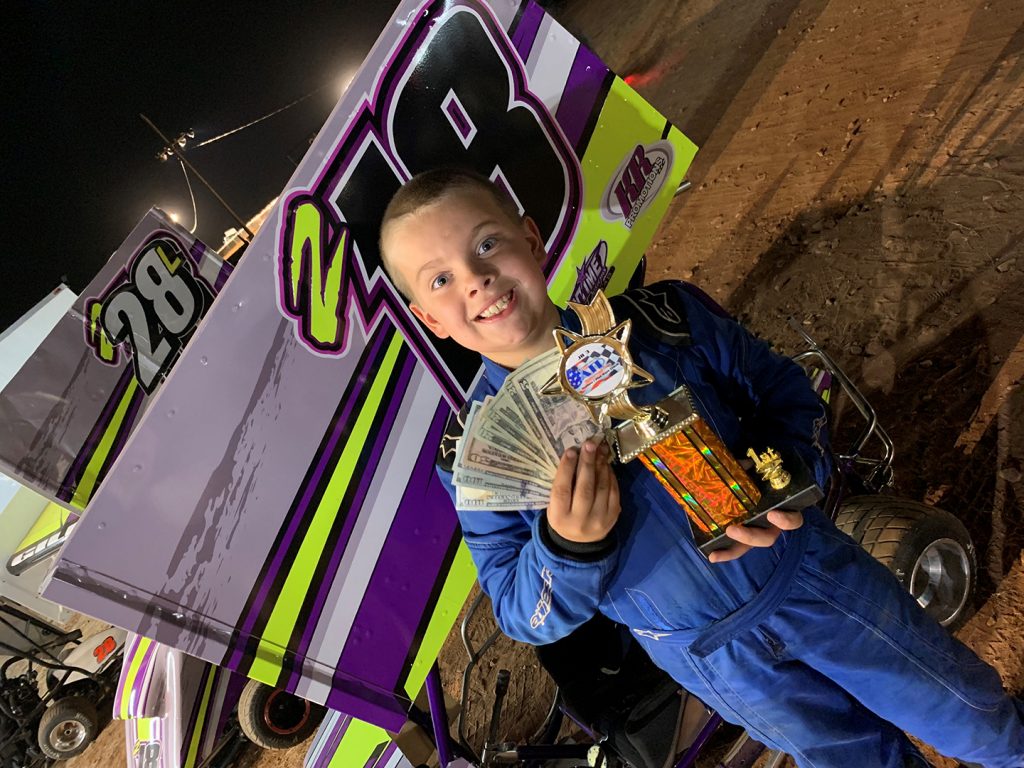 TREY GILES
TREY GILES
Trey is ready to talk racing at any time. He, too, has racing running through his veins with three generations of race car drivers in his family.
“My grandfathers on both sides and Dad all raced, and I have two older cousins who race,” said Trey.
Trey, who is eight years old, started racing when he was five, but was delayed for about nine months due to Covid. He has raced in Texas, Oklahoma, New Mexico, and Louisiana and against kids from California, Iowa, and North Carolina.
Trey said racing has more to it than what you think, but the most difficult aspect isn’t driving. “It’s more than just turning left and hitting the gas,” he said. “The hardest part is being at a new track and not knowing it.” 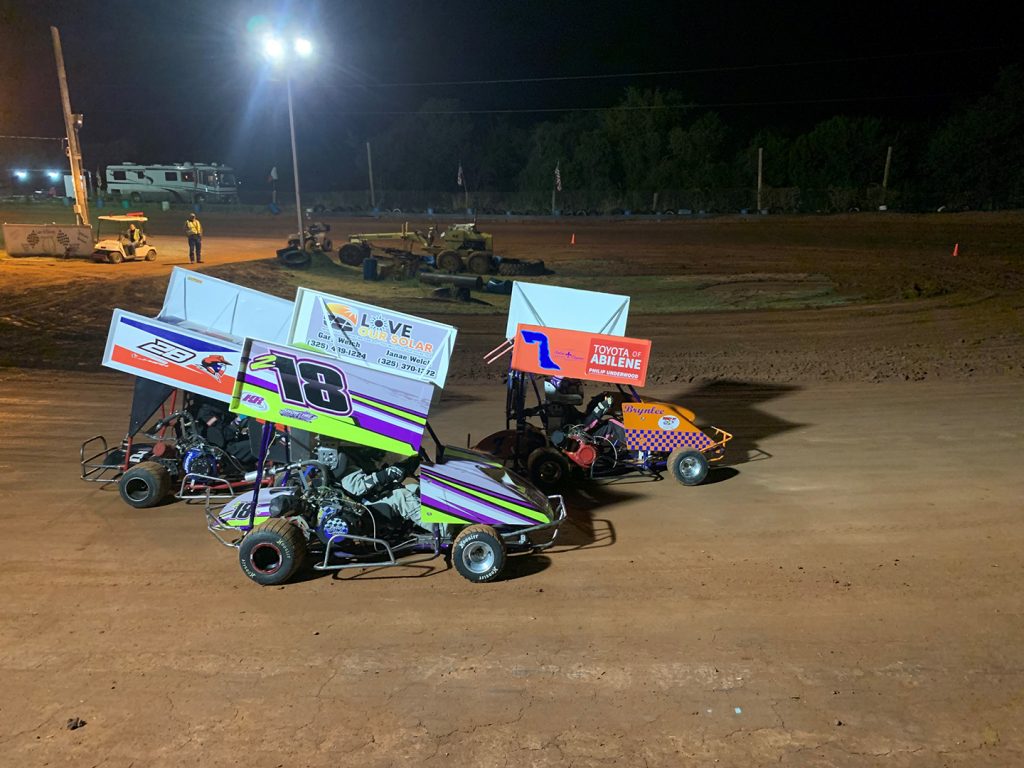
He had advice for first-time racers about how much gas to use and how to remember which pedal to push and when since they drive with both feet. “Don’t press the gas all the way on your first race,” he said. “The right pedal is the ‘go’ pedal and the left pedal is the ‘whoa’ pedal.”
Heather Giles, Trey’s mom, said he usually wins trophies, but this last August he won $375 when he won a race at the ATP Track here in Abilene. “He generally finishes in the top three, and with having raced in about sixty-five races has thirty first-place trophies in his room,” she said.
Trey said he wants to continue racing as he gets older and plans to compete at the highest level of dirt-track sprint car racing.
“I’ll keep racing until I can compete in the World of Outlaws,” said Trey. Until then, the third grader at Wylie West Intermediate School, said he will enjoy playing football when he isn’t racing.
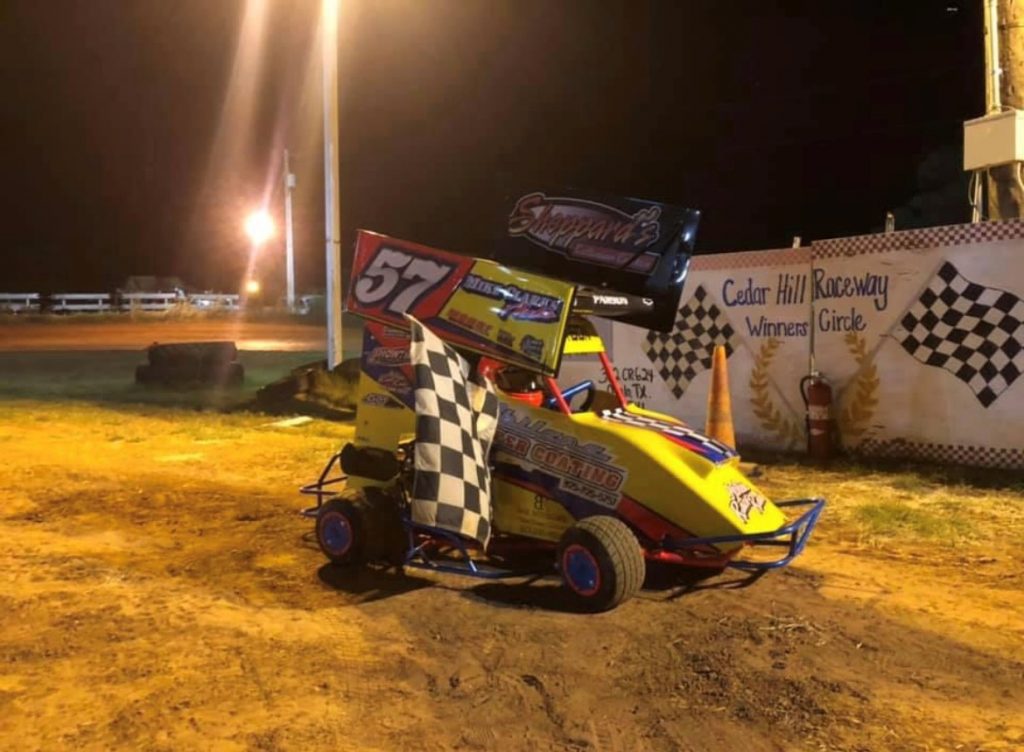 RYDER PARSON
RYDER PARSON
Ryder started racing the earliest of the Bulldogs, driving at four and half years old. There are four generations of race car drivers in his family, and he has two cousins close in age who race — Griffin who is eight years old like Ryder, and Grant who is ten years old.
Angela Parson, Ryder’s mom, said the kids at this age don’t get much opportunity to practice accept during their practice laps, but they have a dirt track he rides a yard cart on to practice. Ryder said getting prepared to race before his actual race does consist of several activities.
“I check my gear, get a snack, watch the track to see how it runs, check gas, and make sure tires are aired up,” said Ryder. “I also take a nap.”
Angela said the races usually take place in the evening and the drivers often must wait between races. “Sometimes races may go until midnight,” she said.
Ryder said driving a race cart is sort of like driving a car but there are some differences. “It’s like driving a car, but with more safety stuff and seat belts,” he said. “Your fingers get tired from holding the steering wheel, and the racing suit gets hot.”
Ryder said he is motivated to win by who he needs to pass, like passing his fellow racers and cousin Griffin. He has raced in fifty races, winning twenty of those and has one track championship under his belt. Ryder attends Wylie West Intermediate. He said he really likes racing but also really likes baseball and doing both is requiring him to split his time between the two.
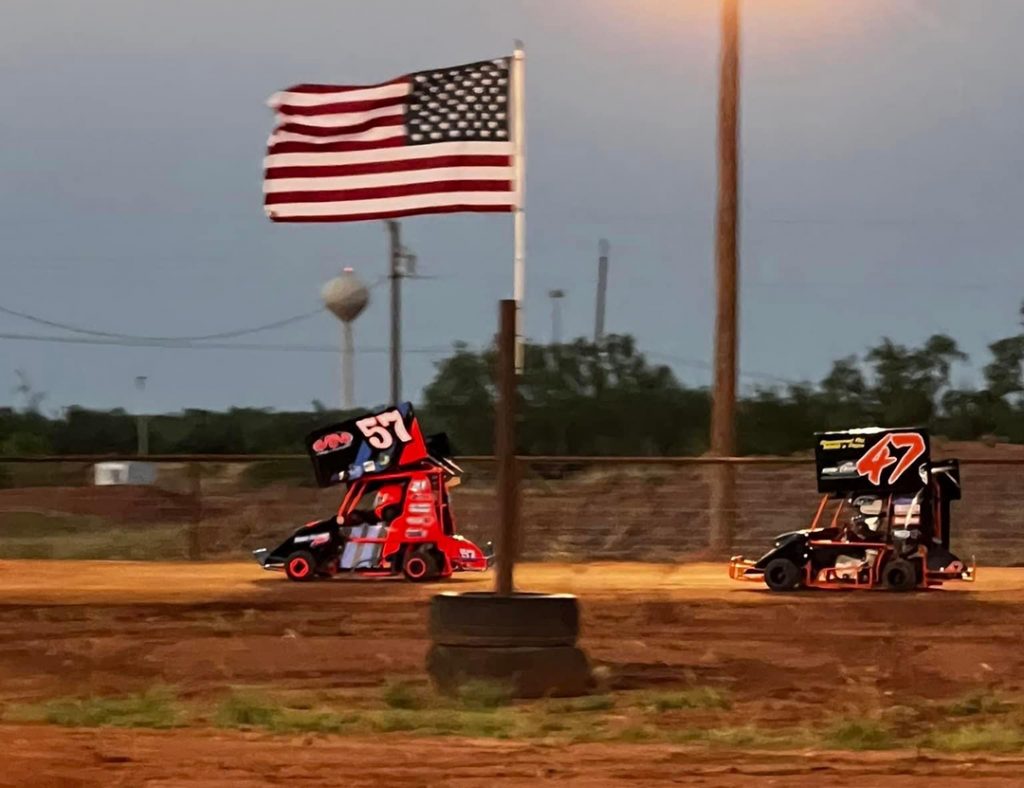 INSIDE CART RACING
INSIDE CART RACING
While cart racing is available at a young age, it is not for the faint at heart. Our little Bulldog racers described themselves as “competitive, fast and fearless.” The racers:
• drive with both feet and the brake and gas pedals being separated by a divider
• wear a fire-suite, gloves, helmet, and racing boots
• are secured into the cart with a 5-point harness, a device that immobilizes the head and neck, and an arm restraint that enables the racers arms from going outside the cart
• can reach speeds up to 45 mph
• drive in two heats and then a final race; a smooth race lasts about 2 minutes
• main racing season is from March through October
• move up to a manual transmission as they get older
Ranked as the fifth most dangerous sport in the world, bull riding is a WILD sport you don’t decide just to try for fun. However, Riley Parker did just that.
 RILEY PARKER
RILEY PARKER
Eight seconds and the light of go has been Riley Parker’s reality for the last 8 months. The Wylie senior who has been team roping with his uncle since he was thirteen years old recently decided to start riding bulls thanks to some of his friends.
“My good buddy, Zach Kerbly, encouraged me to try bull riding when I was helping him while he was riding, but I had been around it at rodeos with my uncle,” he said.
Parker said because he rides horses bull riding has come more easily to him, but he did use training equipment before getting on an actual bull. “I started with a bucking barrel, which I recommend to anyone who wants to try bull riding,” he said. “Also use a helmet because you don’t want to end up like Lane Frost.”
A bucking barrel basically simulates the movement of a bull and is literally a barrel that is tied between two trees or poles. A person pulls a rope that makes the barrel move as if it’s a bull bucking, twisting, or moving side-to-side. Then Parker moved on to riding a “jump-kicker”.
“A jump-kicker is a starter bull,” said Parker. “I stayed on for six of the eight seconds on my first ride.”
Parker said it is generally better to be more compact in size for bull riding, but his long legs help him hang on. Since he also rides horses regularly, sometimes riding bareback, he finds it easier to stay on when a bull jumps side-to-side. In addition to these activities, he works out twice a week to stay fit.
Parker said he does go through a routine before climbing on a bull. “I stretch, slap my thighs to wake-up the muscles, and I pray,” he said. 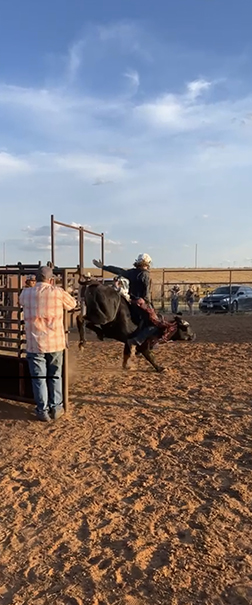
When it comes to competitions, the winter months are slower than in the summer. “In the summer, I ride every weekend, but during the school year it is more like twice a month,” he said.
He has a small group of friends who travel together to shows at Billy Bob’s or The Coliseum at the Stockyards in Fort Worth. He has traveled some outside of Texas where he has had some success. “I won my first buckle when I competed in Bonita, Oklahoma for placing in the top-five of about forty-five riders,” said Parker. “That was just in the first four months of starting.”
As for continuing bull riding after graduation, Parker said it all depends on if he joins the Marines. “I like challenging myself so going into the Marines is a possibility.”
According to the World Atlas, the top 10 most dangerous sports are:
10. helicopter skiing
9. cheerleading
8. Luge
7. car racing
6. gymnastics
5. bull riding
4. soccer
3. boxing
2. Jallikkatu (bull subduing event in India)
1. base jumping
Banana Ball. Banana Pep Band. Banana Nanas. Man-Nanas. Bananaland. It’s all totally BANANAS, and Wylie graduate Zach Smith totally went WILD for baseball when he became a member of famous Savannah Bananas Baseball Team.
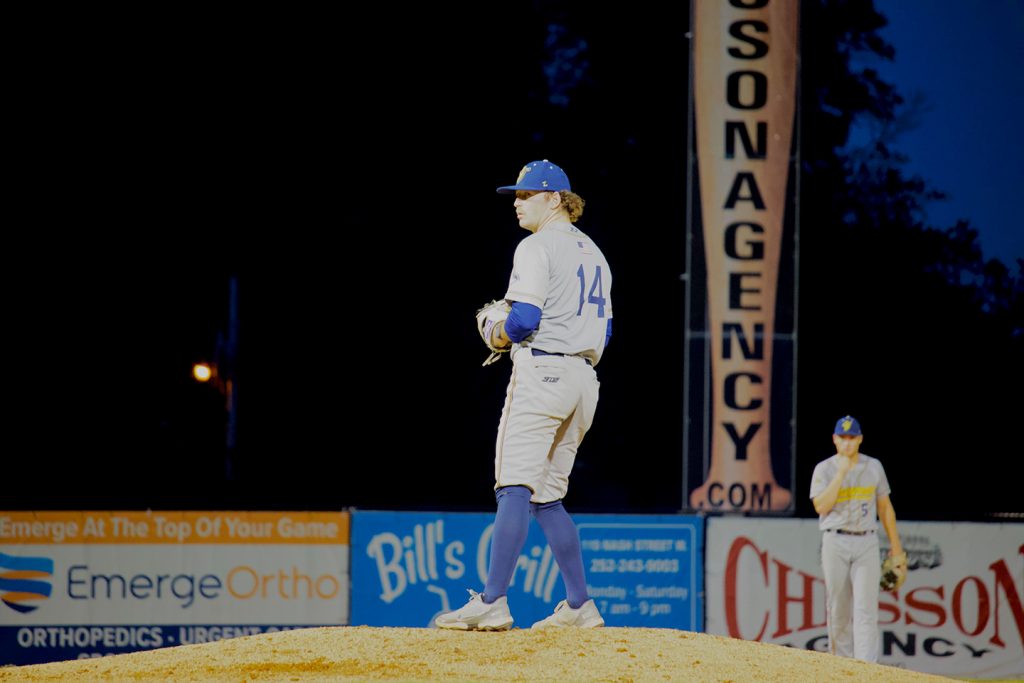 ZACH SMITH
ZACH SMITH
Talking about going wild, Zach Smith had no idea exactly how crazy and wild it would be playing baseball in the historic Grayson Stadium for the Savannah Bananas, an exhibition baseball team in Savannah, Georgia.
Smith said the team has so much fun doing crazy things throughout the game that it takes away some of the stress that can come with playing baseball at higher levels. “There is no experience like it,” said Smith. “It’s about having fun and entertaining about 5,000 people.”
“The games are very much a production with a list of activities and a tight schedule. You would get a list of what you would do by the minute that was very detailed oriented,” he said.
From playing Nintendo Wii Baseball in the bullpen to having a player dance on the diamond or be given a yellow rose when being relieved from pitching – the insanity of it all made playing for the team like nothing Smith had experienced. “When you were given a yellow rose during a pitching change at the mound, you would find a little girl in the crowd to give it to,” said Smith.
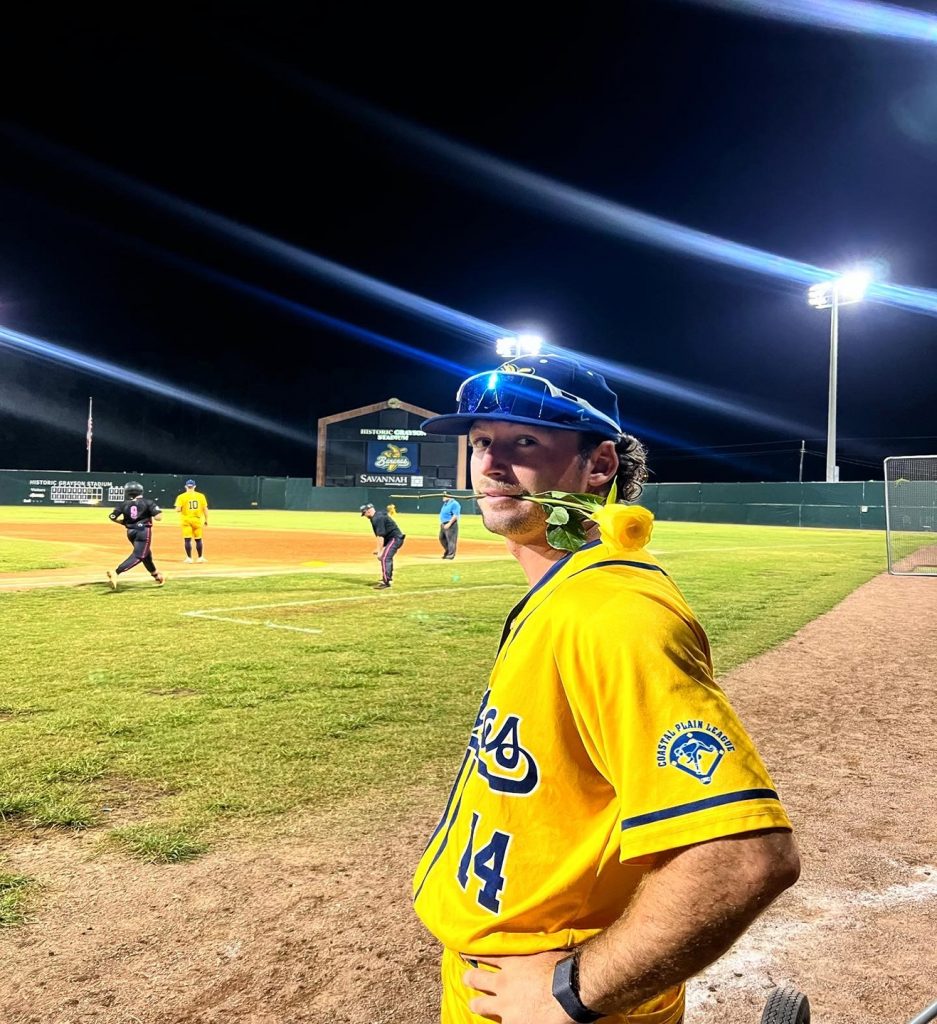
One of his most memorable experiences was when he had to perform the player dance. “I was horrified,” said Smith. He added that it was all he could think about, so it took the stress off if he was playing baseball well.
Smith said the goal is entertaining the crowd, and still playing professionally. “While it’s all jokes and fun, we won our league championship and some of the players were drafted into the MLB,” he said.
When Smith was young, he played in the Wylie Little League. He continued playing through high school and was a member of the Wylie varsity baseball team that won back-to-back state championship in 2016 in 2017. After graduating from Wylie in 2017, Smith went on to play baseball at ACU. During the summers he played in summer leagues around the nation.
Smith is currently back at ACU to play in his sixth and final season of baseball. He had been medically red-shirted in the spring of 2022 for a torn ligament in his shoulder that delayed him and Covid impacted his playing as well. The opportunity to play for the Savannah Bananas came after completing rehabilitation.
Smith said the experience of playing baseball for Wylie, ACU and the Savannah Bananas has been instrumental in who is today. “Playing for Wylie and ACU taught him to be himself, which prepared him for playing for the Savannah Bananas,” said Smith. “The Savannah Bananas would find a role for you that fits you, so I didn’t have to change who I am.”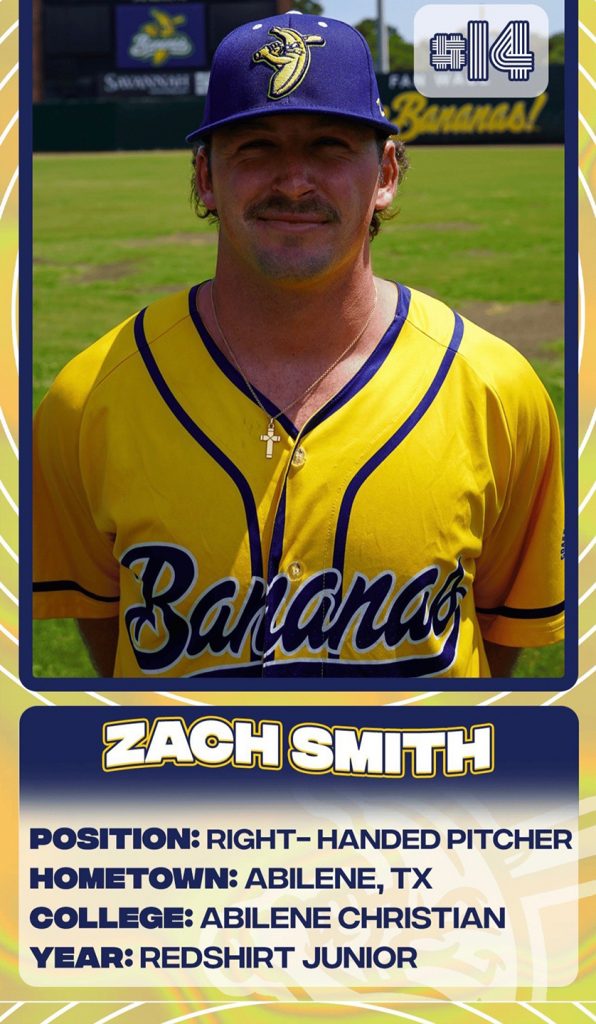
Smith added that playing a sport seriously can take away some of the joy in it. “Step back and acknowledge it is a sport because when you start taking it too seriously, you start playing badly,” said Smith. As he finishes out his master’s degree at ACU, he is continuing to play baseball. “I feel it’s a realistic goal, and I am going to keep chasing it,” said Smith. “I have a great degree to open doors, too.”
Smith’s final advice to the Wylie Bulldogs who are coming up after him was to have fun, to not grow up too fast and know who you are. “Find your identity in Christ, and you can be yourself,” he said. “The world’s opinion of you won’t change your perspective.”
By Kristen Johnson
Photos Courtesy of Amber Underwood, Frank Shedden Photography, Heather Giles, Angela Parson, Riley Parker, Zach Smith






